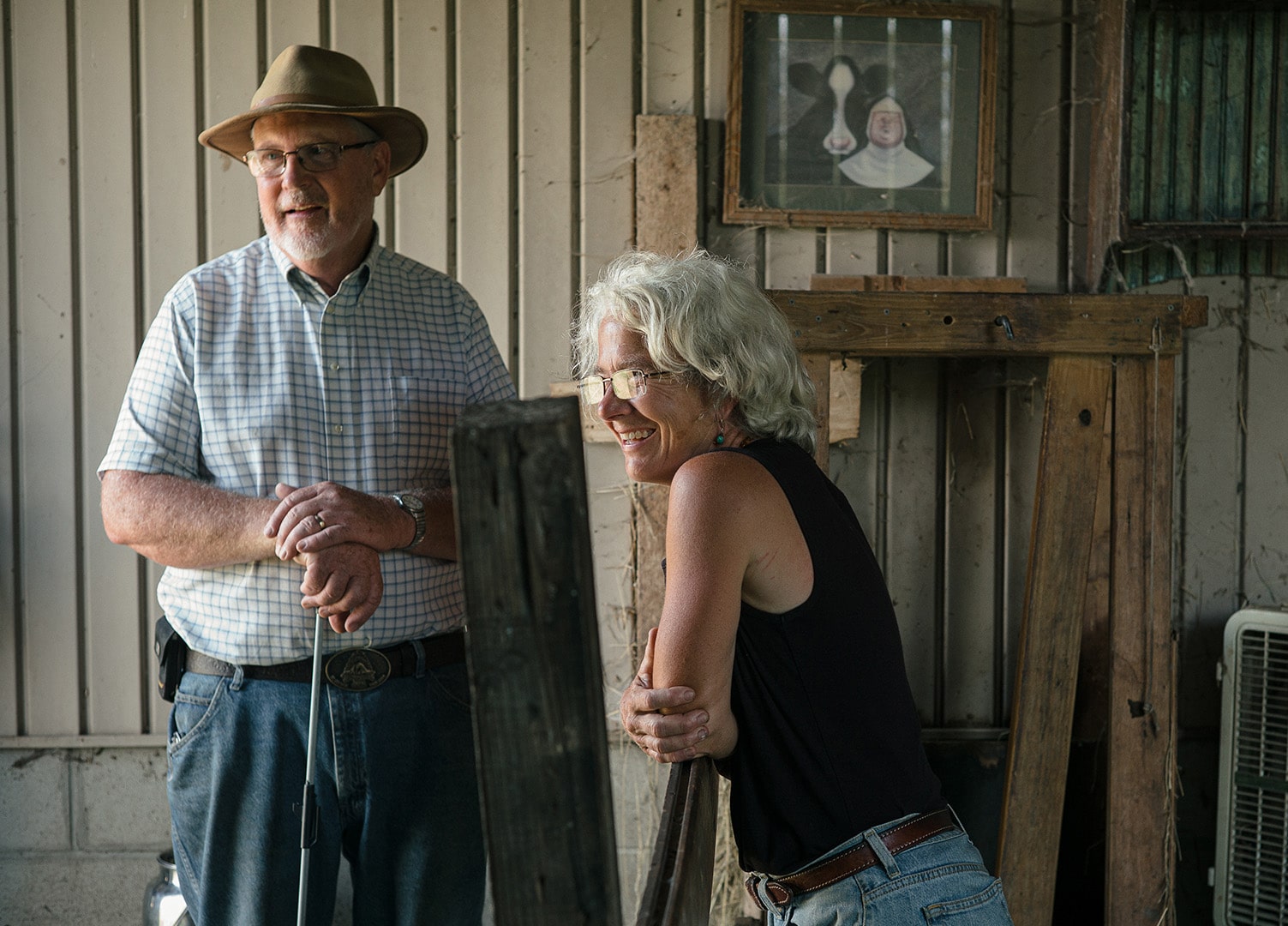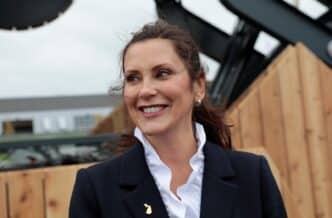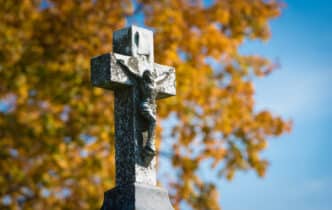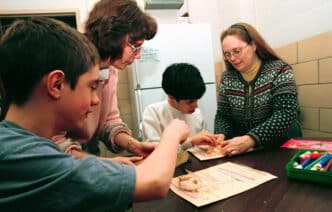Going to daily Mass has tangibly changed the way Beth and Shawn Dougherty use their time and live their lives.
“He’s always been a daily Mass Catholic,” said Beth of her husband. “So, for most of all of our lives, our family has gone to Mass daily, unless there was an obstacle that prevented us from going.”
Beth perceives that frequent participation in the Mass has been the source of many blessings for her family, who homesteads in eastern Ohio.
Amongst these blessings, Beth cites the Dougherty’s “adherence to family unity,” their lifestyle of homesteading — of which they are promulgators — as well as their children’s embrace of the Faith. “They’re all vibrantly practicing Catholics,” said Beth of the couple’s eight children.
She describes Shawn’s commitment to weekday Mass as something not rigidly adhered to, “to the point of straining the family.” Rather, Beth calls it a “practice of love” that motivated the family to accompany him.
Beth sees the positive reverberations of this practice in her family’s life. She believes that prioritizing the Eucharist has oriented their decisions, including how they apply their time and, ultimately, their choice to homestead.
Doing the good
For Beth, attending weekday Mass has been a decision to give primacy to what is truly most important.
“I think that set us up for something that affected the way we homeschooled and the way we worked,” said Beth. “And that was to do the good thing today, without reference to an imaginary future in which you might gain some advantage by doing things differently.”
To clarify, Beth shares a story about a homeschooling friend who “always did music and read aloud time” with her children first. “Then she knew they’d done the most important thing,” said Beth of this woman.
“My friend said, ‘My job is to teach them their faith, read, write, add and subtract, multiply and divide. If they get those basics, I’ve done my job, and everything else is gravy,'” continued Beth.
From this mother’s witness, as well as “Shawn’s daily commitment” to attend Mass, Beth gathered something significant. Namely, there is wisdom in focusing one’s time on what is most deserving. Moreover, the true value of something might be different than what we or the “prevailing culture” are accustomed to believing.
“I’m not going to think, ‘How can I get the most profit out of this time?’ but, ‘How can I make sure I’ve received holy Eucharist the day I die,'” said Beth.
As a convert to Catholicism, Beth didn’t always think this way, or have such priorities.
Embracing the faith of her baptism
Beth recounts how, despite receiving her first sacraments in childhood, she was raised in a non-practicing family.
“The tone at home was anti-Church, anti-religion,” said Beth. “I thought piety was an act, and in very poor taste.”
That perspective changed when she attended the University of Dallas. The community Beth encountered and the formation she received was transformative.
“My experience there was life-changing. … I interacted with a whole bunch of Catholic kids who went to Mass, even daily Mass, and seemed to mean it,” Beth said. “They were happy — genuinely. I didn’t get it, but I wanted a piece of whatever they had.”
The University of Dallas was also where Beth met Shawn.
She explains that from early in their relationship, Shawn had an approach to doing the good in the moment, which influenced her. Beth recalls Shawn’s words from her freshman year.
“He said, ‘Well, always do your schoolwork first, unless there’s somebody you should talk to instead,'” said Beth. “And it was a new thought to me, coming from the culture of ‘grab as much as you can,’ that there was a good to be pursued in the moment which might have to do with service of other people, or community with other people.”
The Doughertys carried this disposition into their marriage in 1985. The couple strove to give priority to what was most important, beginning with the holy Eucharist. This approach flowed into how they educated their children as well as the steps they took to homestead.
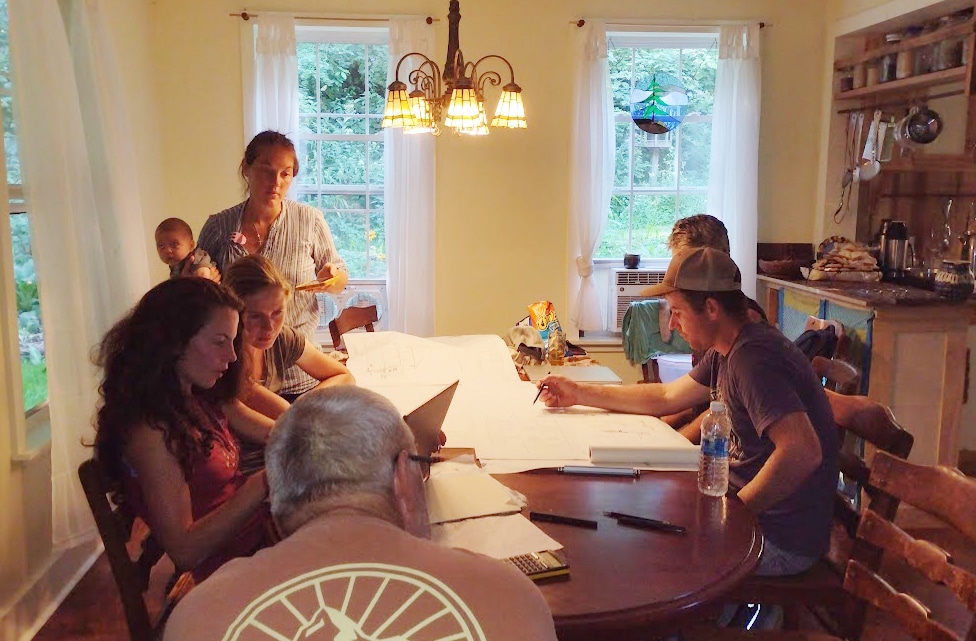
Homeschooling and homesteading
Beth acknowledges that sometimes previously held plans, or efforts toward achieving a far-off goal, need to “give way” to a present good. This could be school lessons for the day or studies with a mind to eventually ace a possible entrance exam in the years ahead.
As an example of a present good, Beth references tasks that required immediate attention on the farm, perhaps on account of weather, such as the family taking advantage of a “sunny day to build a barn.” Or, there could be other variables at play that necessitated a prompt response, such as catching “an escaped animal” or attending to produce that is ready for harvesting.
Farm work takes priority over book work when it’s time to dig potatoes or do chores, said Beth. “Desk work fits into the spaces between.”
She proposes that in homeschooling and elsewhere, present goods ought to take precedence over other activities, including those oriented towards a future “imaginary time” that is not certain of ever happening.
“Our responsibility isn’t for some imaginary future in which we will be able to look back and say, ‘I played my cards right, so that I won. I’m sitting pretty. I’m comfortably off. My income is good. The deck’s in my favor.’ That’s not our calling,” said Beth. “Our calling is to look at this moment and say, ‘What is the good?’ and then go do it.”
She notes that this immediate good is typically within our means. “Do the good in the moment, which you can do,” said Beth.
She explains that this perspective involved a “shift of focus from planning for a future that we don’t know will ever come” to considering “what is the good in this moment, and how can I make it happen?”
Beth credits this focus as foundational to the Dougherty’s making homesteading a reality for themselves, which is also something they support others in doing via speaking engagements and their website, One-Cow Revolution.
“I think [that] was a requisite to have the nerve to make the changes we made and the changes that we’re encouraging other people to make,” said Beth in relation to homesteading.
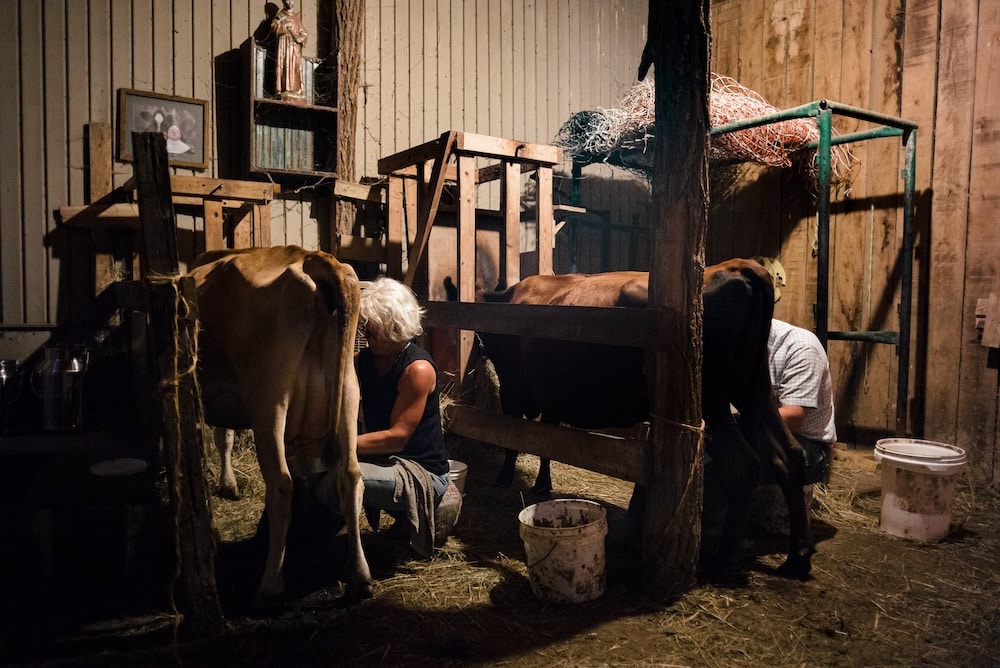
The goodness of farming
Beth stresses that it is not possible to know how things will play out in life. This can apply to concerns on a national level — such as the stability of the economy — or how such matters will affect oneself personally, such as job security. “You can’t know what the results are going to be,” she said.
Even so, the Doughertys enjoyed a certainty about homesteading related to the inherent goodness they recognized in it.
“You can know that God made a good nature that was really intended for us to collaborate with and make it better. And you can know that if you pay attention to it and observe it, you’ll learn to do that,” said Beth.
She affirms that farming is “a good you can be certain about more than you can be certain about” other things that often dominate the investment of one’s time and energy.
Also intrinsic to farming is the necessary focus on the good of the moment, something that coincides with the Dougherty’s Eucharistically oriented life philosophy.
“I think there’s something really vital when we speak to people about farming, it’s really vital in that commitment to doing the good in the moment,” said Beth.
Exciting adventure
In expounding upon this day-by-day total commitment to do the good through farming, Shawn, who taught theater at Franciscan University of Steubenville for 25 years, suggests looking to marriage as an example.
“Once you’re married, you’re in, that’s it, and now it should just be the two of you focused completely on this pursuit,” said Shawn. “It shouldn’t focus internally. It shouldn’t focus on each other. It should be focusing on ‘What is now my calling? What is it that I’m supposed to do?’ And we should have the same thing with a farm.”
Shawn’s spouse of nearly 40 years agrees.
“We shouldn’t build in ‘What’s in it for me? How am I going to make sure that when this goes south, I get out and I’m ahead of the game?'” added Beth.
Shawn recommends responding to the goodness of farming and not complicating that decision. “Stop counting the cost. Jump in,” he said. “Quit overthinking and just do it.”
This is the meaning behind the message Shawn inscribed in his and Beth’s book “The Independent Farmstead.” “I say, ‘Farm with reckless abandon, using God’s pattern,'” he said.
These words are Shawn’s exhortation to others to farm, which he trusts is a sure path to finding not only food for one’s table, but also, the One who is our sustenance.
“Start this adventure, which it is. It’s an exciting adventure that’s full of fun and struggle, and at the end of it, I believe it will lead you to God,” said Shawn.

